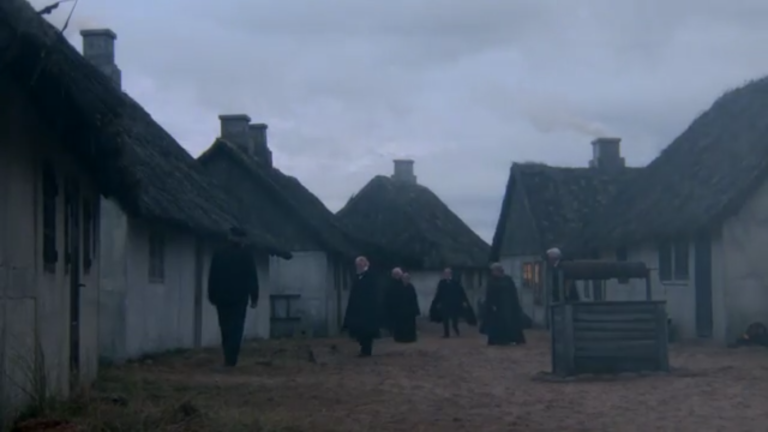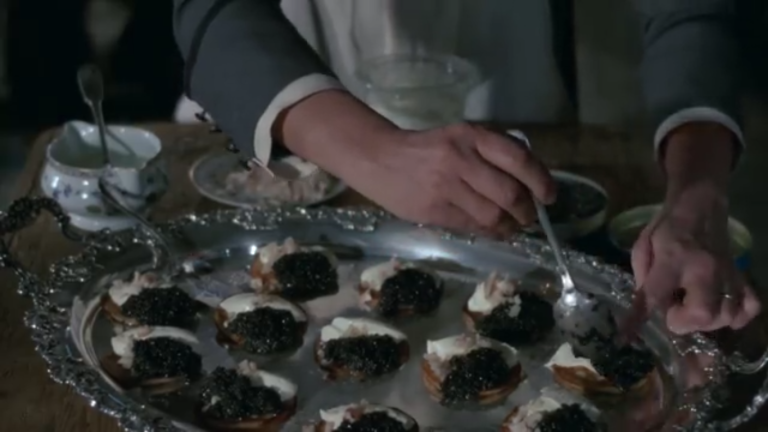Dir. Gabriel Axel. Starring Birgitte Federspiel, Bodil Kjer, Jarl Kulle

Watch enough celebrity chefs and listen to them talk, and one of the common themes they always come back to is the belief in food done “simply.” Simplicity is a devilishly tricky noun, one that, given some of the dishes we see coming out of their kitchen, seems to mean just about anything. But about taste they mean it more or less as they say; too many flavors in a dish muddles all of them. The best food strikes hard at just a few tastes, balancing those with textures and smell and appearance. The skill is in the remarkable delicacy of great chefs, who can make all of those finicky elements unite beautifully. Babette’s Feast is a simple movie. There are simpler ones – among Danish movies alone, one thinks of Ordet and Day of Wrath before Babette’s Feast – but in a year where the cream of European film was especially attractive (Wings of Desire, Au revoir les enfants), this film still holds its own. How neatly every ounce of the plot is organized, like diced vegetables or a cleaned fish on a cutting board. We see the daughters of the pastor lose out on their great chances at love. We see how Babette (Stephane Audran) comes to them by a circuitous, surprisingly political route. We see the heyday and the disintegration of the small sect. And we see dinner, the aftermath, the cleanup. All of it is so simple, but so effective, and there can be no question as to how the past affects the present and why, in these aged days in a small Danish town, people have held back from reconsidering the past too often.
Whether or not Martine would accept the blame, the night of the dinner, which turns into this long referendum for all the assembled company, is mostly her fault. She is the one who announces to the members of the terminally endangered sect that soon it will be the centennial of her father’s birth, and that she and her sister will host a dinner in honor of that happy birth.
Typically I’m annoyed with movies which can’t give much detail about the religious leanings of their characters other than “Christian,” but Babette’s Feast makes the religion of the sect more or less inconsequential because the sect itself is inconsequential. The members were attracted to the minister (Pouel Kern), and when he died his daughters kept up the same meetings. It was always a cult of personality, evidenced by the birthday celebration of a man long dead whose earthly works are virtually unknown outside this stale fishing town. The fact that the minister kept a tight hold on his daughters’ reins while he was alive, never really giving them leave to fall in love or marry despite the suitors they had, shows us that it was always about him and not really about some greater spiritual or religious understanding. Better to allow his daughters, his most faithful adherents, to leave provincial Jutland and go on to great cities – to follow a future general across Europe, or to follow an opera singer to Paris – and give their testimony in that way. But they stay until they are old, grizzled. I love the vision of the sect, each of them well past the age when they could be parents. They wear old-fashioned beards, speak slowly, take their time rising and siting. One of them appears to have forgotten all of his words save “Hallelujah,” which isn’t such a bad word to retain. They are sharp-tongued, almost childish in their senescence. They could no more laugh than they could run a marathon. There will be no new members of the sect. They are totally ephemeral, no more lasting than blinis or turtle soup.

Not only does Martine announce the dinner, and of course allow Babette to cater a real French dinner for the company, but she also has the dream that allows the adherents to slip into what a recently closed musical calls “a state of intoxication.” She is convinced that Babette’s dinner is being brought to them by Satan himself, and so she tells the sect that while they cannot refuse Babette, they must also be silent while eating. They must not comment on the food. But Martine, ignorant of food beyond bread-and-ale soup and whatever passes for coffee in rural 19th Century Denmark, does not seem to understand that being forced to keep all reactions inside is the way to the heart. If it does not leave the mouth, it cannot have left the heart. One would imagine she might have learned that decades ago with her admirer, Lorens (played by Kulle as an older man), but if she did, she has not connected the two situations.
Lorens Lowenhielm is alone among the dinner guests in that he can recognize how old and creaky he is. Before setting out for the dinner with his mother, he looks at himself in the mirror and sighs at his monocle and his bald head. (Like virtually everyone else in this movie, Kulle is probably better known for playing someone else in a different Scandinavian movie. He was Magnus in Smiles of a Summer Night, a rather more bombastic and lively officer than Lowenhielm, and that can’t help but seep into our perspective of the old general. It’s great casting just like bringing in, for example, Ordet veterans Federspiel and Preben Lerdorff Rye is great casting.) He is also alone among the dinner guests in that he understands the grandeur of what it is they’re eating, and of course alone that he will comment on it. He tries to engage the other guests in conversation about, for example, the cailles en sarcophage. They listen politely to him and comment on things like the weather. However, it should not be construed that they are immune to him. One old woman watches how the general tips the last of his broth into his mouth and then, deeply contented to have the permission of another guest, does just the same. He is every bit as useful for the viewer. Not only does his recollection of an earlier meal at the Cafe Anglais in Paris reduce the shock value of Babette’s reveal at the end of the film (for outright shock has no place in a movie this measured), his commentary throughout gives us some ancillary way to appreciate the sumptuousness of Babette’s cooking. The feast is hardly bloodless – we famously watch the quails and the turtle come into the kitchen, each critter knowing well the fate which awaits it – but Lowenhielm makes it refined with the tone of a literary guidebook.
Babette, silent as often as not, is the film’s most wonderful enigma. She comes recommended to the sisters by Filippa’s onetime suitor, the opera singer Achille Papin (Jean-Philippe Lafont). She lives for many years in a backwater far from the most cultured city in the world. It must also be said, as I’ve hinted before, that the sad beauty of the town is an utter necessity. Babette’s Feast must take place where Babette’s past must seem like another dimension; it makes the fact of the dinner as much a miracle as, say, the wedding at Cana. How else could these delicate, beautiful dishes arrive in this unchanging town? No one else could imagine a turtle soup or a papaya but Babette, who keeps her own counsel often as not. The dinner is paid for, unbeknownst to the sisters, with the entirety of Babette’s lottery winnings: 10,000 francs. What possesses Babette to expend her sole source of funds on this totally selfless act – for she does little more than drink a glass of the fine wine she’s bought – is a great mystery. She has nowhere else to go; no one is waiting for me in Paris, she tells the sisters, both of whom were previously a little unnerved by the thought of losing their free labor. (Is Babette a slave? It’s a distinct possibility that no one really talks about!) I like to think that Babette is, like Martine and Filippa, a little afraid that her past has totally disappeared into the ether; cooking the dinner she used to be renowned for by patrons of the Cafe Anglais is her way of proving that she still has it. Where the sisters, despite the kind words in Papin’s letter or the tenderness in Lowenhielm’s farewell, have lost their chance of reclaiming the best of themselves from decades long gone, Babette subtly proves over several courses that the best of herself is only ever 10,000 francs away.
Advertisements Share this:




